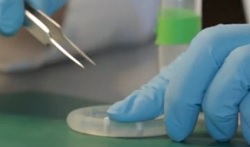 |
| Intravaginal ring--Courtesy of Auritec Pharmaceuticals/Oak Crest |
The U.S. National Institutes of Health devoted $20 million to a group of institutions including Miriam Hospital in Rhode Island to develop an HIV drug-delivering intravaginal ring. The design of a successful ring is a priority in HIV research, and the sustained release of drugs the ring offers could eventually play a crucial role in HIV prevention in the developing world.
The intravaginal ring prototype, called the pod-IVR, is set to be tested with multiple antiretroviral drugs so researchers can determine what combination works best to prevent HIV. Rings developed previously have used as many as two drugs simultaneously, but often a three-drug combination has been most successful against HIV. The new ring can deliver up to 5 drugs at a time in controlled doses--more than any other ring in development.
The ring can deliver antiretrovirals for at least a month, according to the hospital, and the manufacturing process allows inexpensive production, which can help keep developing countries stocked up.
"This project is, in large part, enabled by our pod-intravaginal ring (pod-IVR) platform," researcher Marc Baum said in a statement. "We have shown that the platform can deliver 5 different drugs simultaneously and at independently controlled dosages, which is unlike any other device under development today. In addition, the modular design of our pod-IVRs allows us to accelerate the development of prototypes, a critical element to testing many combinations as part of this program. Our technology platform also has the crucial advantage of scalability in manufacturing as the majority of the fabrication steps are identical regardless of the drug substances in the combination. This scalability and potential for economical manufacture will be crucial for any product to be used in the developing world."
Miriam is working with the Oak Crest Institute of Science, the CDC, the University of Texas, Johns Hopkins, the University of Colorado-Boulder, Scripps Research Institute, UCLA, Vanderbilt University and Auritec Pharmaceuticals.
"The joint effort builds on The Miriam's earlier research focused on developing effective HIV prevention products designed with the user in mind," lead researcher Kathleen Morrow said in a statement. "I believe that optimizing users' experiences can facilitate development of highly effective microbicide delivery systems that could contribute significantly to the reduction of the global AIDS burden."
- here's the Miriam Hospital release